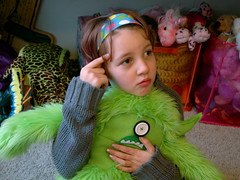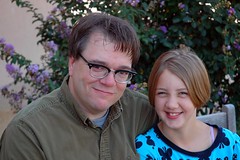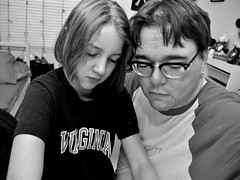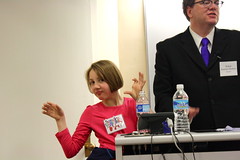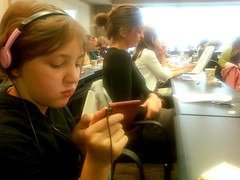I go out of my way to portray myself as a big shot author and disability advocate. Just look at that suit, after all. I must know a lot about this stuff, which is why I get asked to come speak, right? And if I post enough photos or event notices, you might just forget why I'm really here, and why I had a book published in the first place, and why people really ask me to speak (unless they are Baptists). If I'm tricky enough, you might just forget that all I am is a father, and everything I do is in that capacity. Am I an author, or a father who wrote a book about the only thing I seem to know how to do? Does that distinction even matter?
I'm a father, and not just a father, but the father of a mysterious and broken little girl whom no one in the world seems to understand completely. Not her teachers, not her therapists or diagnosticians, and not her extended family. There are times that I think maybe I understand her, but of course that's not true. I try my best, but I am crippled by my love for her, which sounds like a wonderful thing but in reality is wrapped in fear and bias.
I've written
in the past about our resistance to the desire of the school's educational diagnostician to administer a new cognition measurement test to Schuyler, with the aim of a more accurate IQ number that, in her opinion, would likely place Schuyler in the range associated with mental retardation. When it came up again early this semester, we didn't grant permission to administer the test that would measure cognitive impairment (and would include the IQ number and possible MR label), but we went ahead and gave permission to give the rest of the evaluation, which would measure academic skills and performance.
We got the report this week, and it was pretty negative. The diagnostician prides herself of her straight talk, which I appreciate, mostly. She believes Schuyler is retarded, to put it bluntly, and we do not. It's a difference of opinion, although I don't think of it like one of those Coke-or-Pepsi, Mac-or-PC things where we can just agree to disagree. This matters. But still, she's a professional and her opinion counts.
The report doesn't say this, of course, since we refused the cognitive evaluation. But it presents a pretty bleak picture of Schuyler's abilities. And it caused us to begin asking questions about Schuyler's present and her future.
At her annual IEP meeting today, those questions were answered.
So here's the part where I confess that I've been lying to you about something. I haven't been doing it intentionally; until today, I thought it was true myself. But here it is, our new truth.
Schuyler isn't really being mainstreamed. Not to the extent that we believed, anyway. Schuyler goes to a regular fourth grade classroom for science and history and special little projects, and of course she goes to art and music in regular classes. But the bulk of her academic work, the core subjects like reading and writing and math, these take place in her special education class, and the work she's doing there is not age appropriate. Her progress is steady, but not enough to bring her out of special education, and according to her team, she is unlikely to ever catch up.
When I expressed our goal of having Schuyler primarily mainstreamed by the time she leaves middle school, we were told flat out by the diagnostician, with the silent agreement of the rest of the team, that Schuyler is very unlikely to reach that point.
How do we feel? I can't speak for Julie, but for myself, I feel like I've been living a big joke. I feel like in my mind, Schuyler was a serious student with a real shot at living and succeeding in the neurotypical world, but to her teachers and her team, our goals were unrealistic. At one point the diagnostician said that she understood our need to be unwavering advocates and to believe that anything was possible, before she pointed out that it was her job to present the facts as she determined them. And in her eyes, Schuyler isn't just delayed. She has a significant cognitive impairment, and that's that.
We know Schuyler is delayed, yes; remember that she didn't have any real expressive language until the age of five. Her brain and her world developed internally, without language or much real guidance, and I've always believed that the key to reaching her was to understand her world and how she moves through it. But perhaps I'm alone in that belief. We have always understood that she was behind, but it wasn't until today that we really faced the possibility that she might not have the capacity to ever catch up.
I've stood in front of audiences of approving therapists and parents who wanted to believe me almost as much as I wanted to believe myself, and I've told them that thanks to her AAC technology, her good school program, her unstoppable will and her broken but clever little brain, Schuyler was spending the better part of her day in a regular, age-appropriate class, doing the same work as her fellow fourth graders and well on her way to graduation and success.
But as I found out today, that wasn't true. Today I found out that Schuyler may be uniquely broken, but she's got a struggle and a future ahead of her that's identical to thousands of other kids. She's in a school that will continue to teach her and care for her better than most, but one that has a realistic, data-supported expectation for her abilities that we cannot share.
I love my little girl, more than I ever thought possible, and I believe in her with everything I am. But today, I faced the fact that my love for her might just be blinding me. For all my fancy book events and all my inspirational speeches and all my
"gee, what a dad!" accolades, in the end I might be just like any other parent of a disabled child who has convinced themselves that the future is going to be easier, not harder, than the past and the present. I've looked at families with kids who sit solidly within that MR diagnosis and I've counted myself fortunate that my daughter has future options unavailable to them, but that might not really be true after all. It's entirely possible that I've stupidly and arrogantly pitied my own people.
My love for Schuyler has made me a believer and an unwavering advocate, but it might also be making me into a fool. And that's hard to face.
So how do I feel? I'm tired. It's exhausting, trying to build a fantasy world in which you child's disability isn't going to hold her back forever. It's a full-time job, convincing myself that everything's going to work out somehow and that one day she'll tell people
"Why, there was a time when my teachers thought I was retarded, and look at me now! My parents believed in me, and they were right. I'd like to dedicate this Pulitzer to them."And it requires a constant, unblinking effort to convince myself of the very very pretty lie that my little girl is going to be okay.

